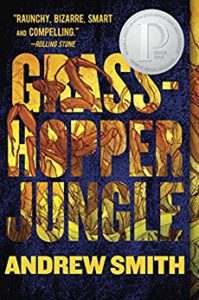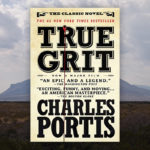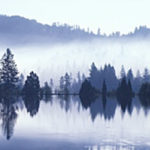Grasshopper Jungle by Andrew Smith
I’ve been fortunate lately: one top-notch book after another. Makes it easy to do a book review! This one proves what lots of readers, writers, and critics contend: some of the best stuff being published today is officially categorized as YA.
Andrew Smith uses abundant amounts of skill and imagination to bring us a story that is kind of a wild-ass and through-the-lens-darkly combo of Slaughterhouse Five, The Chocolate War, War of the Worlds, Catch-22, Tom Sawyer, A Clockwork Orange, The Catcher in the Rye, Lord of the Flies, Alien, The Road, and Dr. Strangelove. Get the drift? It’s dark. It’s funny. It’s sexy. It’s suspenseful. It’s brave. It’s literate. If you’re in favor of all that stuff, read it.
 One problem with writing a book that gets critical acclaim and awards is the fame that goes with it, a problem that very few writers of books for young readers ever have to worry about (take my word for it). If you’re successful, people pay attention not only to what you write but what you say. People (other authors, for instance) may envy your success.
One problem with writing a book that gets critical acclaim and awards is the fame that goes with it, a problem that very few writers of books for young readers ever have to worry about (take my word for it). If you’re successful, people pay attention not only to what you write but what you say. People (other authors, for instance) may envy your success.
Recently Andrew Smith has attracted some criticism, which I became aware of kind of through the back door. First I saw posts of people defending him against an online attack, which led me to look up the attack, which led me to look up his interview comment that set the whole thing in motion. Which left me scratching my head and picturing what exactly a tempest in a teapot would look like.
What happened was, in response to a question about the lack of depth of his female characters, he said (possible tongue in cheek) that he didn’t know females as well as he did guys, that he wasn’t a female and didn’t grow up with any. As far as I can tell, that was it. He admitted that he wasn’t as comfortable writing about girls as he was boys. Which attracted one person’s ire, and then folks took sides. Personally, I don’t get it, but maybe the critics want him to work harder to grasp the mysteries of femaleness.
Or maybe he should’ve said that there aren’t any, that aside from their plumbing and a few other physical characteristics, males and females are exactly the same (ignore all those books and articles and treatises and dissertations and studies and speeches to the contrary!), that given that eighty or ninety percent of new books being published for young adults are written by females for females, he just wanted to write something where boys were the focus, where the story was told from a guy’s point of view and concentrated on the problems boys face and think about and have to deal with. That he simply wanted to write something for boy readers. That might not have been the whole truth, but it would be the truth, and perhaps less controversial.
Read the book, though. The truths–sometimes between the lines–are in the book.
 Previous Post
Previous Post Next Post
Next Post




